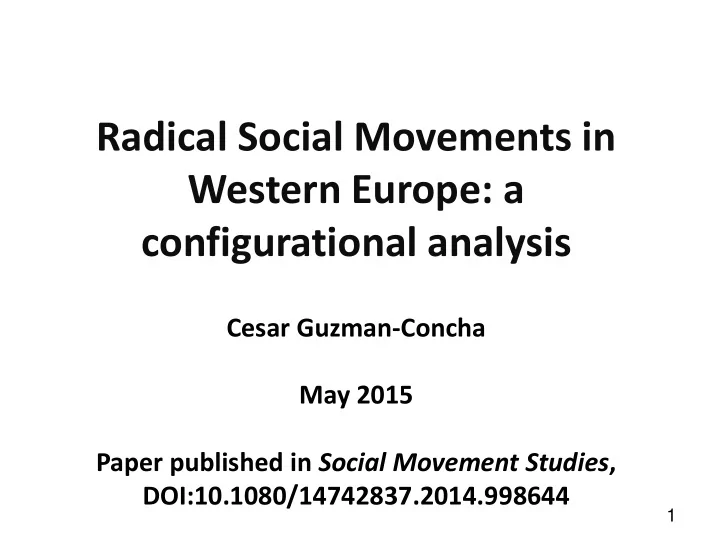

Radical Social Movements in Western Europe: a configurational analysis Cesar Guzman-Concha May 2015 Paper published in Social Movement Studies , DOI:10.1080/14742837.2014.998644 1
Introduction 2
Little comparative research on radical social movements (RSMs), but it was an important topic in social sciences between 1968-1990 Radicalization of the working class (Calhoun, 1982; Gallie, 1983; Lipset, 1983) Middle class radicalization (Bagguley, 1995; Parkin, 1968) New social movements (Kriesi et al, 1995; Touraine 1981) After 1991, interest moved to areas such as far- right parties/movements, populisms, political violence, global justice movements. More recently RSMs in the context of anti-austerity protests 3
RSMs definitions: Instrumental vs countercultural movements (Pizzorno 1978) Families of movements (Della Porta & Rucht 1995) Movement industries (McCarthy & Zald 1977) Mainstream approach: RSMs as by-products of cycles of protest, spinoffs of larger movements What RSMs are? Positional definition Agenda drastic, elite affecting changes. Repertory unconventional, disobedience Identity countercultural 4
How contexts can be related to RSMs strength or weakness? Relative deprivation theory grievances: -youth unemployment -housing stress Resource mobilization theory resources: -leftist communities Political opportunity structure (POS) opportunities and threats: -openness of political systems -responsiveness -polarization 5
Dimension/ Indicators (2000-2008) condition Grievance -Youth unemployment rate Grievance -Housing – home ownership Resources -Left community Openness -Electoral systems -Number of elected representatives Responsiveness -Government effectiveness -Public spending (local authority) Threats -vote of far-right parties Dependent Var. -Survey of experts (Delphi method) 6
Methods . Sample 52 cities, 12 countries, Western Europe Qualitative Comparative Analysis- fuzzy sets (fsQCA) # Configurational combinations of variables -The role of a variable depends on the value of another variable(s) -presence / absence relates to the dependent variable -fuzzy sets: degrees of membership to sets of cases with certain characteristics # Truth table 2 k possible combinations of conditions # Set theoretical causes are subsets or supersets of outcomes - Necessary and sufficient conditions 7
Difference between statistical methods and QCA Tabaquism Heart attack deaths Genetic Sendentarism disposition configurational statistics methods 8
Analysis FRIGHT*[jobless+(owners*leftcommunity)] LEFTCOMMUNITY*JOBLESS*(openness+OWNERS) 9
Analysis 10
Conclusions Interplay of grievances, resources and political institutions configure two major contexts/patterns that explain differences of strength of squatters’ movements 1. Polarization it can counteract the lack of significant resources and higher grievances. Northern Europe 2. Political cultures and grievances necessary conditions that interact with closed or unresponsive institutions. Southern Europe Socioeconomic characteristics of local societies do not produce radical movements alone. Political factors are required (either resources or polarization) 11
Conclusions Some cities fit in more than one pattern, or appear in “non - expected” combinations of conditions. For example: Milan: can be explained both by the Northern European or the Southern European patterns. Milan and Lyon: cities of Mediterranean countries that behave as those of Northern Europe Berlin and London: have a clearly southern pattern, with strong leftist communities and grievances. (also, but partially Copenhagen) Large cities are more likely to have distinctive sociopolitical features, despite being located in rather moderate countries 12
Recommend
More recommend